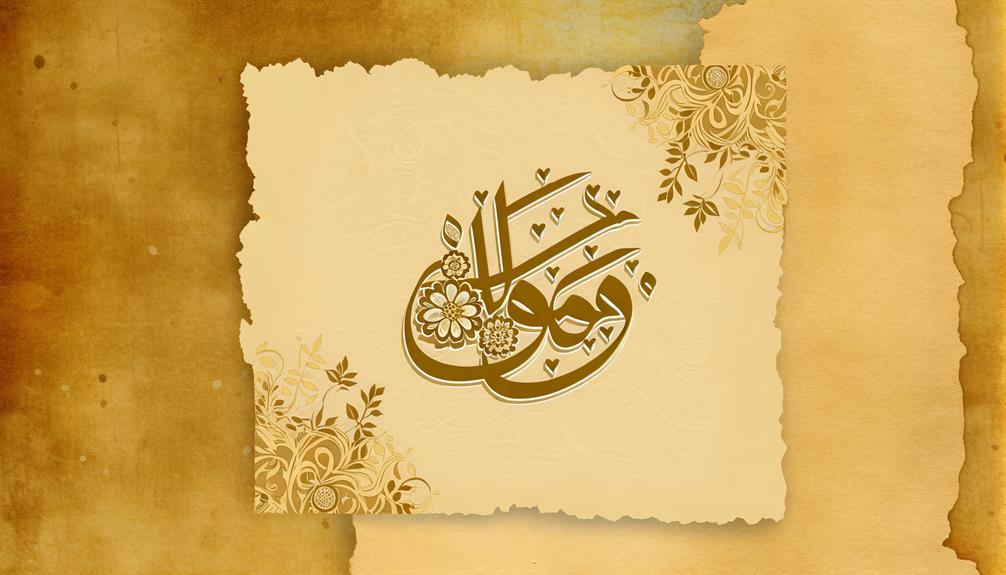Abdal Name Meaning in Urdu
In Urdu, the name 'Abdal' signifies spiritual intermediaries or 'substitutes,' derived from the Arabic term 'Abdāl'. This name carries rich spiritual and mystical connotations deeply embedded in early Islamic texts and Sufi traditions.
Abdals are seen as pious individuals who maintain spiritual and moral equilibrium within society. They hold significant roles in Islamic mysticism, often mentioned in hadiths and Sufi literature as enlightened beings who act as conduits for divine favor.
These figures are revered for their spiritual insight and guidance. Discovering more about the name reveals its profound place in Islamic esoteric traditions.

Key Takeaways
- The name Abdal means 'substitutes' or 'replacements' in Urdu, derived from Arabic.
- Abdal signifies individuals with high piety and spiritual insight in Islamic mysticism.
- In Sufism, Abdals are revered saints who act as spiritual intermediaries.
- The term is mentioned in Sufi texts and hadiths, indicating its deep spiritual connotations.
- Abdals are essential for maintaining spiritual balance and moral integrity in society.
Etymology of Abdal
The etymology of the name 'Abdal' is deeply rooted in Arabic, deriving from the term 'ʿAbdāl' (أبدال), which means 'substitutes' or 'replacements' and carries significant spiritual and mystical connotations within Islamic tradition.
You'll find that the term is frequently mentioned in Sufi texts and hadiths, indicating individuals who are spiritually elevated and chosen by Allah to maintain the balance of the world. In mystical Islamic beliefs, ʿAbdāl are considered part of the hidden saints, known as 'Awtad' or 'Pillars'.
They're believed to possess spiritual authority granted by divine will. Understanding this term's rich etymology helps you appreciate its profound religious significance, transcending mere linguistic roots.
Historical Significance
When considering the historical significance of the name Abdal, you'll find its roots embedded in early Islamic context, often mentioned in hadiths and Sufi traditions.
This name has profoundly influenced cultural and spiritual domains, symbolizing individuals who attain a high level of piety and spiritual insight.
Its historical and religious connotations provide a rich tapestry of meaning that resonates within Islamic scholarship.
Early Islamic Context
In early Islamic history, Abdal, derived from the Arabic term 'بدل' (meaning substitute or replacement), signifies a group of pious individuals believed to maintain the spiritual equilibrium of the world.
Their existence is rooted in various hadiths, where Prophet Muhammad (PBUH) mentions these righteous persons as essential for the sustenance of the moral fabric of society.
You'll find references in texts like 'Musnad Ahmad,' highlighting their role as intermediaries who invoke divine favor upon humanity.
These Abdals are often linked to the esoteric dimensions of Islam, reflecting the spiritual hierarchy within Sufism.
Their presence underscores the importance of righteous living and unwavering faith in preserving spiritual balance.
Cultural and Spiritual Impact
Understanding the historical significance of the Abdal, you'll recognize their profound cultural and spiritual impact on Islamic societies over centuries. The Abdal, revered saints in Sufism, serve as spiritual intermediaries, deeply influencing Islamic mysticism. Their presence, often linked to Quranic verses and Hadiths, provides guidance and divine wisdom.
| Aspect | Description | Example Reference |
|---|---|---|
| Spirituality | Guardians of divine secrets | Quran 2:269 |
| Mysticism | Key figures in Sufi orders | Ibn Arabi's writings |
| Cultural Role | Influencers in Islamic rituals | Annual Urs celebrations |
| Leadership | Spiritual leaders in communities | Stories in Rumi's Masnavi |
| Legacy | Perpetuation of Sufi traditions | Influence in Ottoman Empire |
Their legacy continues to shape cultural practices, ensuring the persistence of Sufi traditions.
Spiritual Connotations
The name Abdal carries profound spiritual connotations rooted in Islamic mysticism, often associated with esteemed figures in Sufism who are believed to possess a special connection with the Divine. In Sufi tradition, Abdals are considered enlightened beings who play a pivotal role in maintaining cosmic balance and spiritual integrity.
They're frequently mentioned in classical Islamic texts, such as 'Kitab al-Tabi'in' by Ibn Khallikan, and are believed to be the hidden saints of Allah's creation. The Quran, while not explicitly naming Abdals, alludes to the concept of righteous individuals who are spiritually elevated.
When you encounter the name Abdal, it invokes a sense of reverence and respect due to its deep-rooted association with spiritual excellence and divine service.
Abdal in Urdu Literature
In exploring 'Abdal' within Urdu literature, you'll find its rich symbolism in poetry, often invoking themes of spiritual transformation and divine connection.
Historical context reveals that this term has been pivotal in Sufi texts, reflecting the mystic's journey and the quest for enlightenment.
Modern writers continue to draw inspiration from this profound concept, integrating its essence into contemporary narratives.
Symbolism in Poetry
One often finds that the term 'Abdal' in Urdu poetry symbolizes spiritual transformation and the quest for divine proximity, reflecting the rich tapestry of Sufi mysticism.
You'll see poets using 'Abdal' to depict a soul's journey towards purification and unity with the Divine. Drawing from Quranic themes and Hadith, they embed this term within metaphors of light, ascension, and inner struggle.
For instance, an 'Abdal' in poetic verses often represents a saint who's renounced worldly desires, embodying devotion and enlightenment. By invoking 'Abdal', poets like Rumi and Iqbal illustrate the transformative power of divine love and knowledge, providing a profound commentary on the human quest for spiritual fulfillment and the ultimate truth.
Historical Context and Usage
Many literary scholars trace the origins of the term 'Abdal' in Urdu literature back to early Sufi texts. It signified individuals of exceptional spiritual status believed to maintain the balance of the world through their piety and connection to the Divine. The 'Abdal' were often depicted in poetry and prose as hidden saints, whose divine favor safeguarded earthly territories.
Renowned mystic poets, such as Amir Khusro and Shah Abdul Latif Bhittai, frequently alluded to 'Abdal' in their works, embedding profound spiritual lessons. These references weren't merely symbolic but served as scriptural affirmations of the 'Abdal's' revered status. Understanding these historical contexts enriches your appreciation of their profound impact on Urdu literary traditions.
Influence on Modern Writers
Contemporary Urdu writers continue to draw inspiration from the concept of 'Abdal,' embedding its rich spiritual symbolism into their narratives to explore themes of divine intervention and moral integrity.
The term 'Abdal' is rooted in Sufi tradition, often symbolizing the righteous individuals who act as a conduit between the divine and the earthly. Modern literature frequently references these figures to illuminate the struggle between good and evil, often invoking Quranic verses to lend authenticity and depth.
Cultural Impact
The name 'Abdal' carries profound cultural significance, deeply rooted in Islamic tradition and often associated with spiritual leaders and mystics in Sufi teachings. You'll find that 'Abdal' refers to a group of righteous individuals endowed with special spiritual status by divine grace.
Within Islamic eschatology, these figures are believed to possess a unique connection to Allah, aiding in the preservation of balance in the world. The term appears in various Hadiths, underscoring its importance in Islamic scripture.
Famous Personalities Named Abdal
Throughout history, individuals named Abdal have often been revered for their spiritual wisdom and leadership, as exemplified by figures like Abdalqadir as-Sufi, whose teachings have left a lasting legacy in Sufi traditions. These personalities have greatly influenced Islamic thought, often drawing from profound scriptural insights.
Here's a closer look:
| Name | Contribution | Era |
|---|---|---|
| Abdalqadir as-Sufi | Sufi teachings, spiritual leadership | 20th Century |
| Abdal Hakim Murad | Islamic scholarship, modern-day influence | Contemporary |
| Abdal Karim al-Jili | Metaphysical writings, Sufi philosophy | 14th Century |
These leaders embody the spiritual depth and intellectual rigor associated with the name Abdal, shaping Islamic discourse across centuries. Their works continue to resonate, offering guidance and inspiration.
Conclusion
In the rich tapestry of Urdu culture, the name Abdal shines like a lantern, illuminating paths of spirituality and historical significance.
As you explore into its layers, you'll find it embodies transformation and divine connection, much like a chrysalis morphing into a butterfly.
Embrace the symbology of Abdal; it's not merely a name but a beacon guiding through the annals of history, literature, and personal identity, resonating deeply within the spiritual heart.






